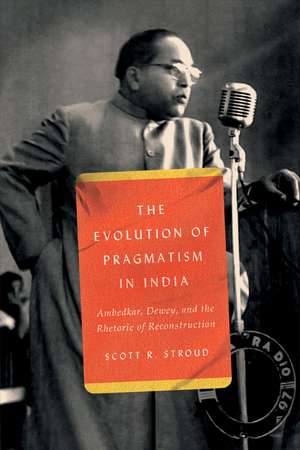The Evolution of Pragmatism in India: Ambedkar, Dewey, and the Rhetoric of Reconstruction
Autor Scott R. Strouden Limba Engleză Paperback – 17 mar 2023
In The Evolution of Pragmatism in India, Scott R. Stroud delivers a comprehensive exploration of the influence of John Dewey’s pragmatism on Bhimrao Ambedkar, architect of the Republic of India’s constitution. Stroud traces Ambedkar’s development in Dewey’s Columbia University classes in 1913–1916 through his final years in 1950s India when he rewrote the story of Buddhism. Stroud examines pragmatism’s influence not only on the philosophical ideas underpinning Ambedkar’s fight against caste oppression but also how his persuasive techniques drew on pragmatism’s commitment to reconstruction and meliorism. At the same time, Stroud is careful to point out the ways that Ambedkar pushed back against Dewey’s paradigm and developed his own approach to challenges in India. The result is a nuanced study of one of the most important figures in Indian history.
Preț: 185.07 lei
Nou
Puncte Express: 278
Preț estimativ în valută:
35.41€ • 38.62$ • 29.86£
35.41€ • 38.62$ • 29.86£
Carte disponibilă
Livrare economică 03-17 aprilie
Livrare express 19-25 martie pentru 25.34 lei
Preluare comenzi: 021 569.72.76
Specificații
ISBN-13: 9780226824321
ISBN-10: 0226824322
Pagini: 320
Dimensiuni: 152 x 229 x 23 mm
Greutate: 0.4 kg
Ediția:1
Editura: University of Chicago Press
Colecția University of Chicago Press
ISBN-10: 0226824322
Pagini: 320
Dimensiuni: 152 x 229 x 23 mm
Greutate: 0.4 kg
Ediția:1
Editura: University of Chicago Press
Colecția University of Chicago Press
Notă biografică
Scott R. Stroud is associate professor of communication studies at the University of Texas at Austin. He is the author of John Dewey and the Artful Life and Kant and the Promise of Rhetoric.
Cuprins
Introduction / Exploring the Evolution of Pragmatism in India
One / Ambedkar and Dewey at Columbia University
Two / The Genesis of Ambedkar’s Reconstructive Rhetoric
Three / Reconstructive Rhetoric, Appropriation, and the Strategic Use of Reference
Four / Pragmatism, Reflection, and the Annihilation of Caste
Five / Education, Force, and the Will to Convert
Conclusion / The Vision of Ambedkar’s Navayana Pragmatism
Acknowledgments
Notes
Index
One / Ambedkar and Dewey at Columbia University
Two / The Genesis of Ambedkar’s Reconstructive Rhetoric
Three / Reconstructive Rhetoric, Appropriation, and the Strategic Use of Reference
Four / Pragmatism, Reflection, and the Annihilation of Caste
Five / Education, Force, and the Will to Convert
Conclusion / The Vision of Ambedkar’s Navayana Pragmatism
Acknowledgments
Notes
Index
Recenzii
"A magnificent study of Ambedkar’s complex engagement with Dewey’s ideas, which he reworked to address India’s specific political and social conditions."
"The book is indeed very persuasive that to fully understand Ambedkar, one must understand his relationship with Dewey. . . . it is hard to imagine a more careful and compelling exploration."
“A work of scholarship that shows the global relevance of pragmatism in the 20th Century introduces the fascinating philosophy of Ambedkar to a non-Indian audience, and provides an entry for further scholarship on this profound thinker and activist. . . . Stroud’s book is groundbreaking.”
"The story of pragmatism is often framed as a distinctly American one, with minor forays and moments of appreciation in Europe and elsewhere. The Evolution of Pragmatism in India helps to revise and reframe that hoary narrative. Stroud, associate professor of communication at the University of Texas at Austin, offers an illuminating exploration of an under-examined figure in pragmatism’s variegated history."
"A book of philosophy and of intellectual history. . . The Evolution of Pragmatism in India will be the definitive account of Ambedkar and Dewey for a very long time."
"Ambedkar’s intellectual inheritance has been delved into like seldom before. . . . The significance of the text must be considerable within both Ambedkarite scholarship and in other disciplines which seek to look into the various issues of social conflict/cohesion and understand them in terms of socio-political operations of force."
"The most anticipated scholarly treatment of Ambedkar’s philosophy, among the half dozen or so books that have been published in . . . years."
"By embedding Dr. B.R. Ambedkar’s brilliant, scathing, and context-specific rhetorical strategies within a broader universe of humanistic debate, [Stroud] seeks to bring anticaste views to bear on expansive and pluriversal conceptualizations of knowledge, society, government and the use of force. . . . Stroud’s greatest contribution to the Ambedkarite discourse might well be a timely resuscitation of Ambedkar’s intellectual nimbleness, freethinking, and doggedly nonideological assessments of problems."
“Ambedkar was one of the greatest legal and political thinkers of the twentieth century, but his thought is barely known in the United States. With wide-ranging research and insightful philosophical probing, Stroud shows that Ambedkar, using Dewey’s works as a fulcrum, created a distinctive form of Buddhist pragmatism, committed to meliorist social dialogue, non-anger, and the flexible pursuit of social democracy. A major achievement.”
“In this meticulously researched book, Stroud positions Ambedkar’s engagement with Dewey’s thought as a defining moment in the global history of American pragmatism. The Evolution of Pragmatism in India is a major contribution to Ambedkar studies, which enlarges our methodological repertoire for approaching this foundational thinker of caste inequality.”
"Stroud’s in-depth exploration of the influence of Dewey’s pragmatism on Ambedkar’s thought not only allows us to comprehend the positions that Ambedkar took but also, equally, to appreciate the compromises he made in his policy engagement for Dalit empowerment from 1919 to 1956."
“In this carefully researched and skillfully presented work, Stroud examines Ambedkar’s adoption of a revivified Buddhism and Dewey’s pragmatism as tools for his struggle against the Hindu caste system. By expanding our understanding of the global potentials of pragmatism, Stroud has made a major contribution to East-West scholarship.”
